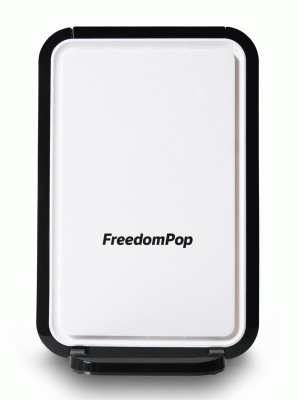FreedomPop, the wireless broadband company that started out offering free mobile data plans with 500MB of bandwidth for free, today began offering its Hub Burst modem for pre-order with an early 2013 expected arrival date. The modem uses Clearwire’s WiMAX network to provide customers with in-home broadband connections at speeds it claims exceed DSL connections. FreedomPop is offering the first gig of data free for the new service, citing median household usage of less than 5.5GB as a clear sign that there’s room at the bottom for both free and cheap plans that significantly undercut those from more established providers.
For home users, FreedomPop doubles the free monthly allowance of bandwidth to users, but other elements remain the same. The company is still rewarding users with additional bandwidth for inviting their friends to join the service, much like web-based service startups Dropbox have done in the past. Users can also earn more usage via standard promotions, like signing up for a free service trial, or they can pay starting at around $10 to get access to more capacity. And to add a true social element, FreedomPop allows individuals to both offer up spare capacity, and request that others in their network share excess data with them. That way, if someone in your circle isn’t even using their full 1GB, they can give some to a relative or pal, rather than just letting that additional capacity go to waste, as happens with most plans from major providers.
The home service will be available beginning in Clearwire’s top 80 markets for WiMAX by subscriber numbers, with the exception of San Diego and Phoenix, covering approximately 100 million people. FreedomPop CEO Stephen Stokols told me in an interview the company is intentionally limiting the launch pool only to markets where it can guarantee speeds faster than DSL, since they really want to provide a home internet experience that can contend with traditional connections, rather than a second-class experience.
“For a home device, we want to make sure the speeds are better than a home device,” he said. “So anywhere where there’s a little bit weaker coverage, but it’s still showing clean on a coverage map, those aren’t going to cut it. Part of what we’re saying here is that you’re going to get faster service than what you’re using already, as well as cheaper.”
Stokols also updated me on the progress his company is seeing with their ongoing mobile bandwidth offering which included introducing a WiMAX-friendly iPod touch case for turning Apple’s media player into something more akin to a phone in late October. So far, so good says Stokols, since they’re seeing around 15 invites per user, with over half of the users sharing their bandwidth with groups of friends. And despite the fact that FreedomPop only charges for users with demands above and beyond their basic service, nearly half of all users are signing up for paid plans so far, making for a promising conversion rate thus far.
Many remain skeptical that FreedomPop’s social model can work in a market where traditionally companies have succeeded often by milking low use customers, but Stokols things there remains a huge opportunity to better serve the bottom of the market, both on the go and now at home, too, and he argues the numbers are starting to back that up.
